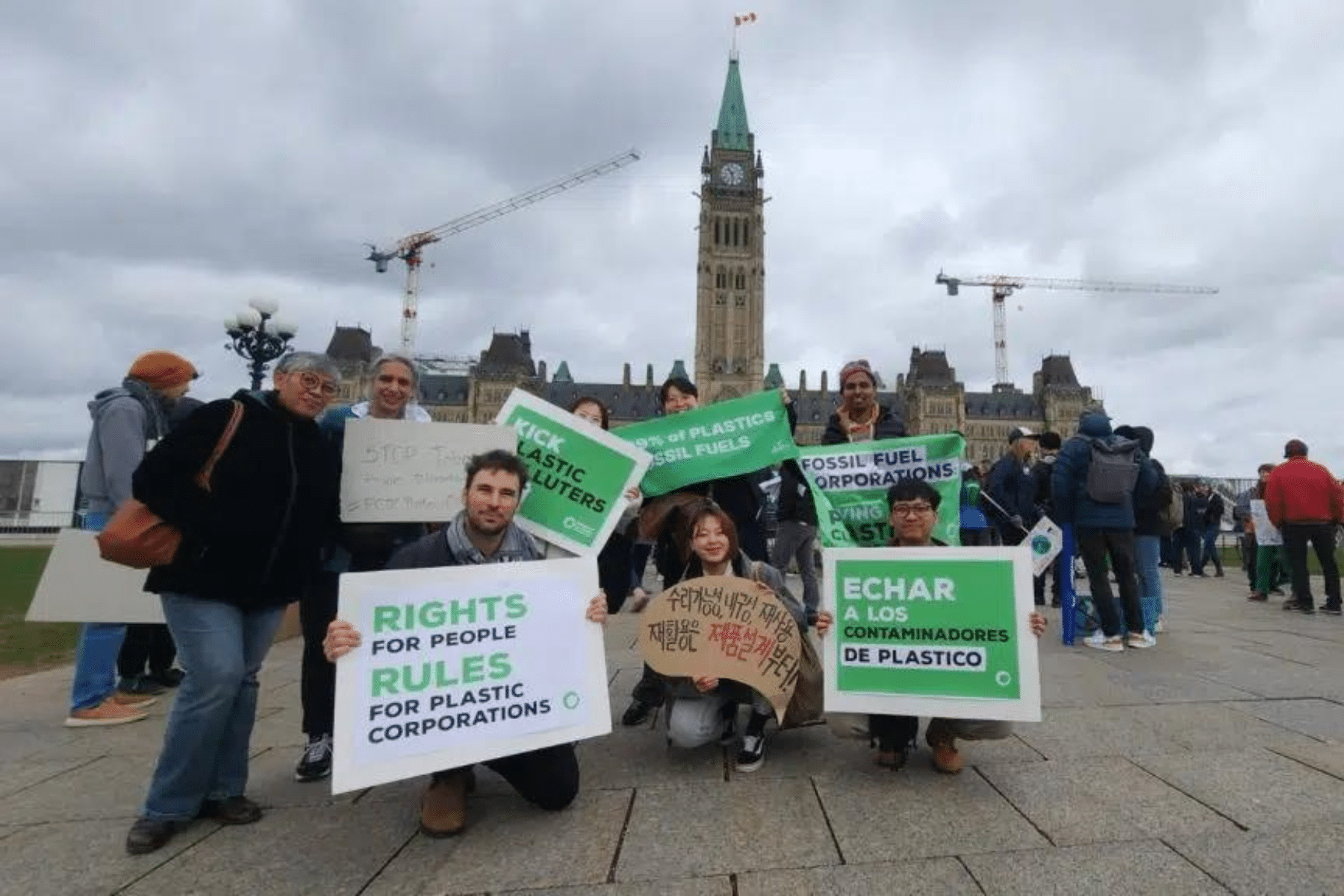
Friends of the Earth International: Global Plastics Treaty CTA
Media Release from FOE International: Kicking out polluters key to progress at negotiations for a first-ever global Plastics Treaty
Tuesday 23 April 2024, Ottawa (Canada) – As delegates gather this week to make headway on what many hope will be an ambitious legally-binding plastics treaty, civil society groups including Friends of the Earth International are pushing States to ensure the Treaty covers the full life cycle of plastics, from production to waste, and ends the ongoing plastics waste trade and cuts corporate influence out of the equation.(1)
Alongside heads of State and civil society groups, corporate players from the fossil fuel, petrochemical and plastics industries are expected to make themselves known at the INC-4 negotiations. This follows the heavy presence of corporate lobbyists from the fossil and chemical industries where they outnumbered delegates from the 70 smallest countries combined – a 36% increase from INC-2.(2)The presence of industry players, however, comes as little surprise considering their increasing reliance on plastic production. Today, 99% of plastics are derived from fossil fuels.
Sam Cossar-Gilbert, from Friends of the Earth International, says:
“A people-powered movement and some governments are proposing ambitious steps to address the plastic problem, like regulating the harmful waste trade, single-use bans and reducing global plastic production. But multinational corporations will also be lobbying with their false solutions, distractions and delays. Only by stamping out corporate capture can we deliver a new global treaty to end plastic pollution.”
Meanwhile, millions of tonnes of low-grade, dirty and mixed plastic waste are being dumped in countries in the Global South, where they are often simply incinerated, landfilled or allowed to leak into the environment. Just as attention is being called to the production side of the plastics life cycle, negotiations are also marked by demands for an end to the export of plastics from the Global North to the Global South.(3)
Mageswari Sangaralingam from Sahabat Alam Malaysia (Friends of the Earth Malaysia), says:
“Waste colonialism, whether in the form of trade in plastic waste and other hidden plastics, perpetuates social and environmental injustice. However, ending the plastic waste trade without reducing plastic production will likely trigger more dumping, cause toxic pollution, and contribute to the climate crisis. The global plastics treaty is an opportunity to plug loopholes and address policy gaps to end plastic pollution.”
With overwhelming support from the public for a plastics treaty, Friends of the Earth International is calling on States to be both ambitious and bold, to hold corporations to account and to center those impacted by the plastic pollution crisis.
Media contacts
Ghislaine Fandel, ghislaine@foei.org. Remote 23-29 April; speaks English/French/Spanish.
Notes for editors
At this stage in the plastic treaty negotiations, procedural issues will be key to the success of INC4 and the establishment of a future treaty. Some key outcomes of procedural success include;
- Mandate approved for intersessional work (between INC4 & 5)
- Approval of Rules of procedure
- robust and productive negotiations by states on treaty obligations that streamlines current Revised draft text
- Establishing legal drafting group
INC-4 is shaping up for fights and decisions on:
- Scope – Ensuring the Treaty covers the entire life cycle of plastics from extraction and production to consumption, disposal and waste.
- Binding rules – The need for legally binding measures and global targets, going beyond voluntary approaches to global governance that have historically failed.
- Corporate accountability – Recognising the central role of transnational corporations (largely from the plastics, fossil fuel and petrochemical industries) in causing the plastic pollution crisis and considering direct obligations and targets to regulate their impact.
- An end to waste colonialism – Banning all plastic waste exports from the Global North to the Global South.
- Greenwashing and false solutions – Including strong control measures and avoiding false solutions like plastic credits, plastic offsets, chemical recycling, waste-to-energy, co-firing, co-processing and/or plastic-to-fuel processes.
- A human-rights-based approach – Ensuring a just transition with reference to the universal rights to access to information, centrality of waste pickers, workers rights, participation in decision-making, freedom of expression, rights to a safe, clean, healthy and sustainable environment and other fundamental rights.
- Finance for the Global South – Establishing a dedicated global implementation fund with contributions from Global North countries to support Global South countries and economies in transition to comply with Treaty obligations.
- System change solutions – Supporting solutions that aim to reduce, reuse and redesign plastic products while scaling up reusable alternatives.
- Zero-Waste Hierarchy – Basing the Treaty on the Zero-Waste Hierarchy of refuse, reduce, repair, reuse and redesign of materials, making recycling a last resort.
References
- Friends of the Earth International demands for the binding treaty on plastics (April 2024)
- Center for International Environmental Law Press Release (Nov. 2023)
- Africa’s zero-waste warriors pave the way to a historic plastics treaty Blog (Nov. 2023)




